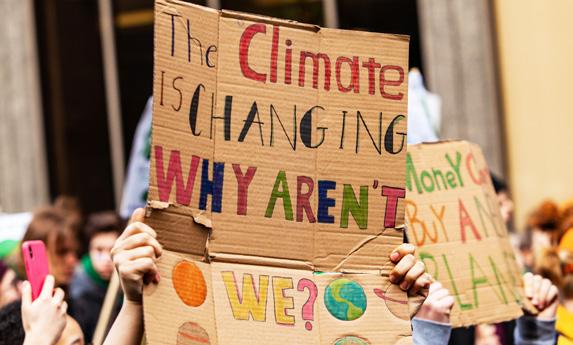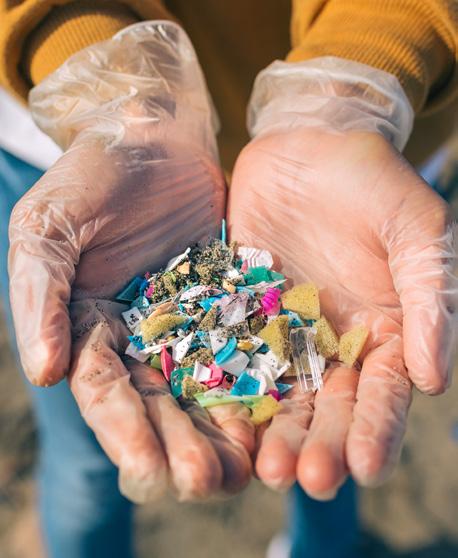
6 minute read
Net zero: the urgent call By Andrew Clark The climate crisis is upon us. There’s greater pressure than ever for businesses to adopt sustainability into their practice, but few know where or how to even start. A new initiative from Practice Building has the answer, and it’s squaring up to change the industry for good.
by Vision Now
What does ‘sustainability’ mean to you? Is it some consumer trend?
A new fundamental of successful business? Is it making the world a better place for future generations? For us at Practice Building, it’s all that and more. We’ve long been helping practice owners create businesses that support the lives they want to live – and nothing about that has to change whilst we simultaneously help them operate sustainably so that our grandchildren can thrive.
Most people reading this article will be at least somewhat aware of the climate crisis, but let’s quickly recap what it really means…
Future In Your Hands
The earth is steadily warming due to increasing concentrations of greenhouse gasses like carbon dioxide, methane and nitrous oxide in the atmosphere. These emissions are caused largely by the combustion of fossil fuels; however, we only burn those fossil fuels to support the lives that we like to live, so that’s really the underlying cause.

This global heating of, at the time of writing, about 1.2 degrees above preindustrial levels1 is causing the melting of polar ice caps (and permafrost), the disruption of oceanic currents and global weather patterns, increased severe weather events, desertification, sea level rise and ocean acidification. These forces are destabilising the myriad of beautiful and complex self-regulatory systems that keep earth habitable; leading to landscape change, mass extinction of biodiversity, ecological collapse, and increasingly severe food and water insecurity – fundamentally destabilising the foundations on which humanity depends.
In 2015, world leaders set targets to prevent the more severe climate change scenarios, aiming for no greater warming than 1.5 degrees facilitated by a global reduction in emissions to reach net zero carbon emissions by 2050. Given that in 2023, global greenhouse gas emissions are still increasing, we’re sitting around 1.2 degrees warming and are on track to pass 1.5 degrees by 20301. Those pledges of action have demonstrably failed – leaving the future of humanity in the hands of anyone who’s willing and able to do their bit. Many businesses have mirrored government commitments to go ‘net zero’ by 2050, and others have more ambitiously pledged to be net zero by 2030 (or earlier).

But, given that we have until 20252 to pass peak global emissions to stand a chance of preventing climate change from getting catastrophically out of hand, there’s an urgent need for businesses to go net zero now. Hence, Practice Building has created the Net Zero Optics (NZO) programme; to help our industry do what needs to be done as quickly and easily as possible.
Public concern over the climate crisis has never been greater
just their job. I’m an MSc environmental scientist by education; I’ve done my time as a tropical conservationist and an environmental filmmaker, and I’m more than a little bit cross that the world is in such a dire state. Because every time new research is published, the situation gets a bit more bleak, and people just continue as normal – as if the world isn’t visibly falling apart around them.
My one consolation is that I’m not alone in this desperation or fury; more and more people are finding the strength and the pride to stand up, make a change, and support others in doing so. Here’s a case in point...
Earlier this year, new research3 was published demonstrating unequivocally that 1.5 degrees is much more than a political target – it’s a boundary that will push critical earth systems into irreversible collapse; notably the Greenland and West Antarctic ice sheets, the melting of which will trigger a 10m rise in global sea level. That’s nothing › less than terrifying.
We’ve been unable not to talk about this research with clients, and it’s such severe news that for most people it’s a moment when all this hypothetical climate projection stuff suddenly becomes real. Because for many people in the UK the effects of climate change have been some far future unknown; despite the eight hottest years on record being the last eight years4,5, it’s been too easy to remain contentedly unaffected by the science.
But when we recently shared this devastating headline with a client in Jamaica, their response was astonishing: “Yeah,” they said with a shrug (it was a video call). “We’re feeling this here already, all the best beaches are already gone. And we’re furious that nothing adequate is being done nationally.” As the call concluded, NZO expanded from the UK and became an international movement.
Take Meaningful Action
NZO is designed for anyone in our industry to take meaningful action on climate change quickly, without it hurting their profit. There’s lots of science behind it but, in practice, calculating your business’s carbon footprint is remarkably simple. It’s also remarkably easy and affordable to offset your carbon footprint with internationally-accredited programmes that build truly sustainable societies.
Because we’ve spent over a decade helping practice owners tackle new challenges while increasing profits, we’re helping participants reach net zero without it costing them a penny. We’ve even helped set up a not-for-profit organisation, Net Zero Eyecare, to handle the off-setting finances while awarding official certifications for businesses to verify their actions.
Now, critics of off-setting say it’s a means to carry on polluting. Fair enough. But I’d far rather organisations carried on polluting and off-set it all, than just remain focused on making a few small reductions to their otherwise rampant emissions.
That’s not to suggest that reducing emissions isn’t imperative. We desperately need to reduce emissions and start to restore earth’s vital systems. I wholeheartedly welcome the NHS’s upcoming requirement of a Carbon Reduction Plan for any organisation that provides NHS care. Yes, it’s inconvenient for practices but, as Al Gore has repeatedly sought to remind us, nothing about the climate crisis is particularly ‘convenient’.
If you have all the data to hand, we can get your practice certified net zero carbon in an afternoon. But for most people on the NZO programme, a leisurely 90 days is fine.
Elephant In The Room
‘Sustainability’ is, of course, about much more than climate action – but if the climate crisis goes unaddressed, we won’t have the luxury of being more sustainable in other areas. The real elephant in the room for the optical industry is plastic.
Plastic has a substantial carbon and environmental footprint, and plastic pollution is a global scourge; there’ll be more plastic than fish in the sea by 20506 without radical change. Plastic debris clogs waterways and literally chokes biodiversity, while microplastic particles are globally ubiquitous – from the deepest-reached ocean trenches to floating around inside living tissue (including yours, probably7) carrying with them a potential cocktail of harmful substances8
Calculating your plastic footprint is remarkably easy. For all the tonometer caps and little plastic sleeves cluttering up a small receptacle in the back of your practice, we’re not avoiding the fact that during an ideal working day every patient who enters your practice leaves with at least one extra bit of plastic than they came in with.
It’s easy (and important) to take a hard line on plastics in eyewear: if a plastic item leaves your practice destined for anywhere other than a recycling facility, you can’t guarantee it will be recycled so it counts as plastic pollution. You can easily and affordably ‘off-set’ that plastic pollution through verified projects that remove plastic from the environment elsewhere, work with our partners to provide complete spectacle recycling, and get a Net Zero Plastic certification too.
WILL YOU JOIN THE MOVEMENT?
That all may sound like a lot, and it’s a huge win for businesses to achieve net zero carbon and/or plastic – but that’s only the beginning of the NZO programme as, after those certifications, we begin to take on the biggest sustainability challenges that will underpin societies of the future.
The future of life on earth is what’s at stake here, and not one of us can make an adequate difference alone – but together we can do something quite profoundly powerful.
That’s what love most about NZO – it’s not just a great business programme, it’s a movement. Nearly everyone I’ve spoken to about NZO has expressed one thing: deep relief that finally they can alleviate their pent-up guilt, take the actions they know are necessary, receive recognition, and be part of something much bigger than themselves. Every single participant on the programme, and receiving certification from Net Zero Eyecare, is inspiring further action throughout this industry. And if this industry can do what’s necessary and achieve net zero in the next few years, maybe they all can.
Visit www.netzerooptics.com to join the programme and start taking action today.
References
1. IPCC Special Report: Global Warming of 1.5˚C. www.ipcc.ch/sr15/chapter/spm
2. IPCC Climate Change 2022: Mitigation of climate change. www.ipcc.ch/2022/04/04/ ipcc-ar6-wgiii-pressrelease
3. World Economic Forum. Leaders Urge Action as New Science Shows Earth Systems at Tipping Point. www.weforum. org/press/2023/01/leaders-urge-actionas-new-science-shows-earth-systems-attipping-point
4. BBC News. Past seven years hottest on record. EU satellite data. www.bbc.co.uk/ news/science-environment-59915690
5. Met Office. 2022 provisionally warmest year on record for UK. www.metoffice.gov. uk/about-us/press-office/news/weatherand-climate/2022/2022-provisionallywarmest-year-on-record-for-uk
6. World Economic Forum. The New Plastics Economy Rethinking the future of plastics. www3.weforum.org/docs/WEF_The_New_ Plastics_Economy.pdf
7. The Guardian. Microplastics found deep in lungs of living people for first time. www. theguardian.com/environment/2022/apr/06/ microplastics-found-deep-in-lungs-of-livingpeople-for-first-time
8. World Economic Forum. Our homes are full of harmful microplastics. Here’s how to minimise the risk. www.weforum.org/ agenda/2021/05/microplastics-homehealth-climate-change-risk









